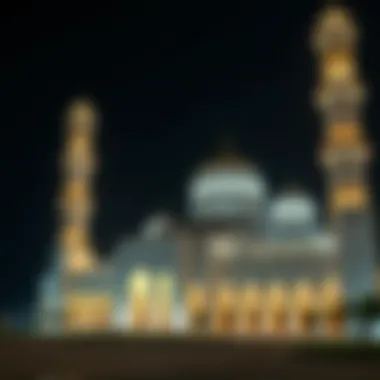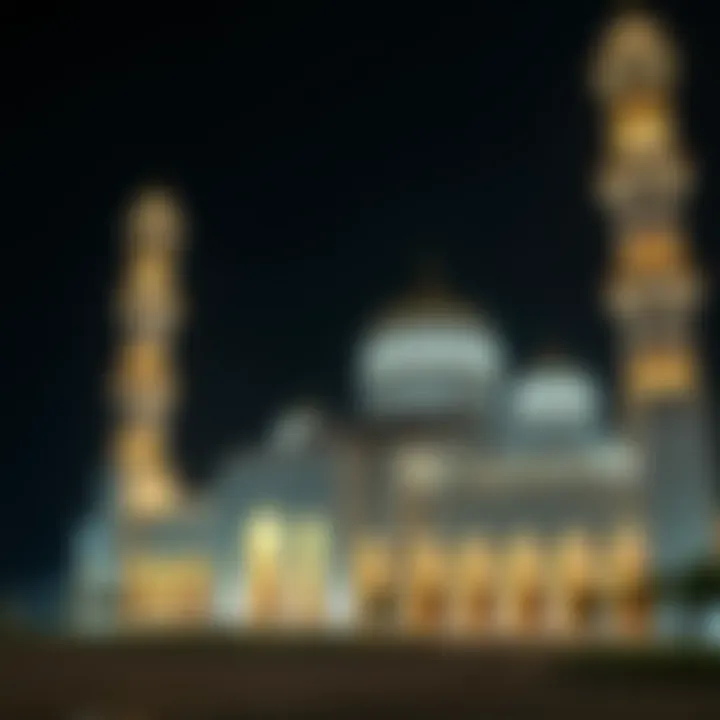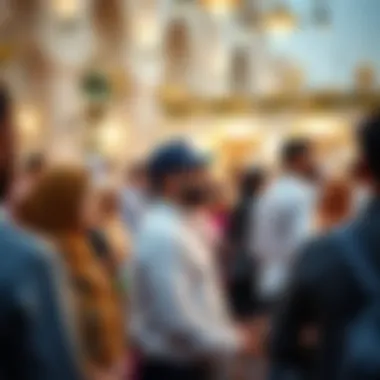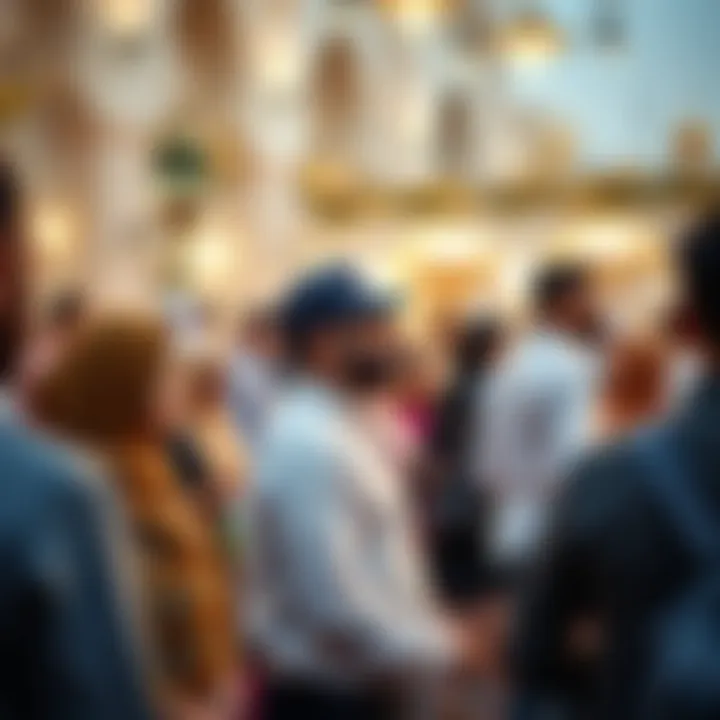Ramadan 2024 Start Date in the UAE: Insights and Impact


Intro
Ramadan is a sacred month for Muslims around the world, noted for fasting, reflection, and community. As the anticipation for Ramadan 2024 begins to brew, understanding its start date in the UAE becomes crucial not just for religious observance, but for wider societal and economic interactions.
The significance of Ramadan goes beyond mere calendar relevance. It deeply influences several aspects of life in the UAE, particularly in cities like Dubai, where business and community life are intertwined with cultural practices. The lunar calendar, which governs the Islamic months, means that the precise date of Ramadan can only be confirmed closer to its arrival, as the sighting of the moon plays a pivotal role.
With this backdrop, it’s essential for residents, potential investors, and business owners in the UAE to grasp how Ramadan will shape their activities and interactions during this blessed month. With that in mind, let's dive into the market trends and insights related to Ramadan in the UAE.
Market Trends and Insights
As Ramadan approaches, it's much like a tide coming in, slowly but surely changing the landscape. Real estate and business sectors begin to align their strategies in preparation for the month ahead. Underlying trends can set the stage for what one can expect in both the short and long run.
Current Market Analysis
Right now, many landlords and property managers monitor the fluctuations in demand that occur before and during Ramadan. Traditionally, there’s an uptick in interest in rental properties, as many expatriates and families might seek to relocate for a fresh start as the holy month approaches. The allure of the community spirit and family gatherings draws people back to their loved ones or new experiences in places like Abu Dhabi and the bustling streets of Dubai.
Moreover, the hospitality sector gears up for increased traffic. Hotels often see a surge in bookings related to Ramadan if they provide facilities for Iftar meals—this is the evening meal when fasting ends.
Future Predictions
Looking ahead, the trends suggest that with a growing expatriate population and evolving attitudes towards work-life balance in the UAE, we might see more businesses adapting their operations to cater to the needs of their clientele during Ramadan. For instance, restaurants that offer Suhoor and Iftar services can expect to thrive.
In the context of real estate, one can anticipate gentrification of certain neighborhoods that see a rise in demand during this holy month. Community engagement will grow, with activities and festivals enriching the atmosphere as the month progresses.
"The month of Ramadan holds complex layers of significance, shaping the social and economic fabric of the UAE in ways that are truly profound."
Property Investment Strategies
For those eyeing property investment, Ramadan creates unique opportunities—even if they seem counterintuitive to the untrained eye. Changes can open various pathways for enterprising individuals.
Tips for First-Time Investors
- Timing is Key: Considering when to invest is essential. Often, property prices can fluctuate before Ramadan and be more stable during it, as buyers become more committed during this period.
- Cultural Understanding: Familiarize yourself with how Ramadan influences local culture and expectations. You’ll likely find more flexibility in negotiations if you’re respectful of the lifestyle changes that come into play.
- Community Insights: Engage with local community forums and groups to gather insights that aren’t usually available in official documents. Understanding the local sentiment can position you better.
Understanding the Rental Market
Navigating the rental market during Ramadan requires finesse. Here are a few points to consider:
- Flexible Leases: Many landlords may offer shorter lease terms to accommodate tourists or temporary residents during the month. This flexibility can work in favor of those who need quick accommodation.
- Renewal Rates: If a property was rented out during Ramadan last year, landlords may increase their prices based on that demand. Knowing the trends can help in negotiation.
- Cultural Amenities: Properties that are close to mosques, markets, and community centers often see increased value and interest.
Understanding Ramadan
Ramadan holds profound importance not just for Muslims but also for communities across the globe, particularly in regions where Islamic culture is predominant, like the UAE. In this section, we explore the various dimensions of Ramadan, offering insights into its historical, religious, and cultural significance. Understanding this holy month can be valuable for residents, expatriates, and investors alike who want to navigate the unique dynamics it introduces.
Historical Context
To appreciate Ramadan fully, it’s essential to delve into its historical roots. The observance is believed to date back to the inception of Islam in the 7th century, when the Quran was first revealed to Prophet Muhammad during this month. This revelation is not just a historical fact but serves as the bedrock of the month’s significance.
As time marched on, the practice of fasting evolved into a communal observance. Families gather to break their fast, and mosques become centers for evening prayers. The month encapsulates a journey through time, reminding participants of their faith and cultural heritage.
Some interesting particulars to note include:
- The tradition of asking for forgiveness and seeking mercy, which followers believe was modeled by the Prophet.
- The importance of community through shared meals such as iftar. This is where family and friends come together, creating a sense of unity that transcends individual differences.
Religious Significance
From a religious standpoint, Ramadan is the ninth month of the Islamic lunar calendar. This period is marked by fasting from dawn until dusk, which goes beyond mere abstention from food and drink. The fast is seen as a time for heightened prayer, reflection, and community-building.
During this month, many Muslims endeavor to read the entire Quran, hoping to connect more deeply with their faith. This reverence often translates to increased acts of charity, as people are encouraged to share their blessings with those less fortunate. The spiritual outcomes of fasting include:
- Enhancement of self-discipline: Abstaining from physical desires nurtures a greater focus on spiritual growth.
- Empathy for the less fortunate: Experiencing hunger fosters understanding and compassion towards those who face food insecurity daily.
- Strengthening of communal ties: Iftar gatherings promote closeness among families and friends.


Cultural Practices During Ramadan
Ramadan is not only a time for religious observance but also for rich cultural practices that vary across regions. In the UAE, cultural festivities bloom under the influence of modernity and tradition alike.
Celebrations include colorful decorations and intricate lanterns hanging in public spaces, brightening streets and homes alike. Cities resemble vibrant marketplaces, showcasing an array of food stalls during the evening hours. Additionally, there are cultural performances that bring communities together for entertainment and education about Ramadan.
Some notable practices include:
- Iftar with traditional dishes: Families often share local dishes, including dates, lentil soup, and various sweets, emphasizing cultural culinary heritage.
- Family gatherings: These occur regularly throughout the month, reinforcing the cultural significance of communal eating.
- Charity drives: Many organizations ramp up their initiatives during this time, collecting food and donations for those in need, showcasing the month’s emphasis on charity.
In summary, Ramadan weaves together a tapestry of religious devotion, historical continuity, and cultural expression, making it a pivotal period in the lives of many. Recognizing its significance offers invaluable insight for all who live within or engage with the UAE during this time.
Ramadan in the UAE
Ramadan carries a special weight in the United Arab Emirates, weaving through the fabric of society and culture in noticeable, significant ways. It's not just a month of fasting but a period where routines shift, community bonds strengthen, and profound spiritual rejuvenation occurs. This is why understanding how Ramadan manifests in the UAE provides a valuable lens through which to view the socio-cultural dynamics of this diverse nation.
Local Observances
In the UAE, local observances during Ramadan are rich and varied, reflecting the unique cultural tapestry of the region. Families gather in the evenings to break their fast after sunset, partaking in meals known as Iftar. Often, these meals include dishes such as harees and luqaimat, which both hold cultural significance and flavor. Public display of these meals presents an opportunity for unity among people, whether they are citizens, residents, or tourists.
Additionally, mosques come alive during this holy month, offering Taraweeh prayers post-Iftar. The sights and sounds of the faithful gathering elevate the spiritual atmosphere. This aspect cannot be overlooked, as it fosters a sense of belonging and community among worshippers, particularly in a multicultural city like Dubai.
Moreover, you'll find that neighborhoods organize charity events and food drives, making charitable giving a core practice during Ramadan. By lifting others up, communities reinforce their bonds, showcasing the UAE's ethos of generosity and hospitality.
Public Life Adjustments
When Ramadan commences, public life in the UAE undergoes noticeable adjustments. Government institutions and businesses typically amend their working hours, often operating for a reduced duration to accommodate those observing the fast. For instance, many offices might open later in the morning, closing in the early afternoon, which allows employees to break their fast with family and friends.
Furthermore, dining establishments in the UAE adapt their practices to respect the observance of fasting. Many restaurants either close during daytime hours or operate in a discreet manner to honor the customs of those fasting. It's common to see special Iftar menus emerging, tantalizingly priced to encourage both residents and visitors to socialize and rejoice in the shared experience of breaking fast together.
Traffic patterns also see turmoil during this month. The roads appear busier just before Iftar, as people rush home for the evening meal. This adjustment requires a degree of patience and adaptiveness, particularly within urban areas like Dubai and Abu Dhabi, where daily life moves at a rapid pace. Residents and visitors alike should keep this in mind while planning their daily schedules.
"The essence of Ramadan in the UAE is not confined to fasting alone; it embraces community spirit, unity, and charity, weaving connections that go beyond the individual experience."
In summary, Ramadan represents more than just a calendar event; it's a time of significant societal shifts. Understanding these local observances and public life changes will help you navigate both personal and professional interactions during this month, enhancing your experience in the vibrant society of the UAE.
Ramadan 2024: Start Date
Understanding when Ramadan begins in 2024 is crucial, not only for practicing Muslims but also for those living and working in the UAE. This time is saturated with cultural and religious significance, steering a great part of social life and even business operations in the region. The date holds sway over various aspects such as shopping habits, dining customs, and social gatherings.
Expected Date of Commencement
In 2024, Ramadan is expected to start around the evening of March 10, depending largely on the sighting of the moon. This uncertainty surrounding the exact date adds a layer of anticipation to the month. Typically, the Islamic months are based on lunar cycles, causing variability with each year. Therefore, it’s advisable for businesses and individuals to remain flexible during this transition.
- Key Implications:
- Changes in working hours and business operations affect everyone, from retailers to real estate agents.
- People may need to adjust their schedules, especially when planning activities around iftar meals.
This vital signifier serves as a guideline for observance in the community. Individuals often rely on community announcements or local mosques to confirm the new moon sighting, further deepening the sense of community.
Lunar Calendar Considerations
The lunar calendar dictates the rhythm of Ramadan, giving it a different feel each year. In 2024, we will see Ramadan beginning in early spring, which is relatively favorable for fasting, as the days are longer but also more temperate compared to the scorching summer months.
However, there are notable challenges due to weather and logistics, notably:
- Day Length: As days progressively lengthen in March, fasting will extend, impacting energy levels.
- Public Facilities: Malls, restaurants, and businesses follow unique hours based on Ramadan observances, requiring both locals and expats to be in the know.
The interplay of lunar cycles and cultural timing heightens social awareness, making entire communities more synchronous in their activities.
This lunar framework means that the precise timing of events, whether it’s breaking fast or planning community meals, will depend directly on moon sightings. As 2024 unfolds, many will keep close tabs on lunar predictions, blending anticipation with cultural reverence.


Finale
The upcoming Ramadan presents a myriad of factors to consider. Understanding both the expected commencement date and the implications of the lunar calendar lays the groundwork for adapting to the month ahead. For residents and prospective investors in the UAE, being in tune with these shifts ensures not just compliance, but also deeper integration into the community’s cultural fabric. As many search for accommodation or make business decisions, aligning with these elements can yield fruitful outcomes, both spiritually and financially.
Impact on Real Estate Activities
The impact of Ramadan on real estate activities in the UAE is multifaceted, affecting both market dynamics and investment behaviors. It's a period marked by shifts in demand, consumer sentiment, and operational strategies, which can significantly sway decisions for homebuyers, investors, and real estate agents alike. Understanding these nuances helps stakeholders navigate the complexities of the market during this time.
Market Trends During Ramadan
As Ramadan unfolds, the real estate market often experiences noticeable shifts. Homebuyers and investors frequently adjust their approach during this holy month. There’s a general slowdown in property transactions, which can be attributed to various factors.
- Consumer Mindset Change: Many potential buyers focus on spiritual practices and family gatherings, diverting their attention from purchasing decisions.
- Increased Focus on Family: During Ramadan, the value of family time tends to take precedence. This often results in a temporary pause in searching for new properties as families prioritize collective engagements.
- Altered Viewing Schedules: Property showings may become less frequent, with some prospective buyers opting to delay viewings until after the month concludes.
- Strategic Listings: Some sellers may choose to hold off on listing properties during Ramadan since they believe it may dampen interest and lower selling prices.
Interestingly, while immediate transactions might decline, the period can also be an opportune time for strategic investing. Agents who can adapt to offers tailored for this context may uncover hidden gems for their clients.
Investment Opportunities and Challenges
Investing during Ramadan comes with both opportunities and challenges, reflective of the shifting market landscape.
Potential Buyers' Behavior
During Ramadan, potential buyers may adopt a more cautious approach. Key characteristics of this behavior include:
- Increased Research: Prospective buyers typically engage in more thorough research throughout Ramadan. They spend time assessing the market, comparing properties, and weighing options rather than making impulsive decisions.
- Budget Reevaluation: Many families reassess their financial situation during this month, considering charitable donations and increased expenses. Those looking to buy tend to have a tighter focus on budget management.
- Cultural Sensitivity: With heightened awareness of the religious significance of Ramadan, buyers often choose to delay offers or negotiations until after the month is over, respecting the observance.
This behavior, while seemingly passive, actually presents certain benefits. By understanding this cautious mindset, real estate professionals can better tailor their interactions with clients by providing educational materials and market insights that resonate with their needs.
Seller Strategies
Sellers must navigate the unique landscape of Ramadan to optimize their chances of successful transactions. Strategies can vary significantly, emphasizing the importance of adaptability:
- Staging and Presentation: Properties that are well-prepared for Holy Month gatherings can stand out. Homes that reflect cultural elements associated with Ramadan, like beautiful iftar setups, may attract buyers more effectively.
- Timing of Listings: Some sellers may find it advantageous to hold off listings until the end of Ramadan, while others might list early in the month. This depends on assessing market activity and timing the market correctly to suit buyer behavior.
- Flexible Negotiation: Sellers might also adopt more flexible negotiation strategies during Ramadan to accommodate buyers' obstacle patterns. Those who are accommodating may find themselves in a stronger position when negotiations resume post-Ramadan.
Business Operations During Ramadan
During Ramadan, the landscape of business operations morphs into something quite unique. The significance of this month goes beyond mere observance; it influences how businesses function, interact, and engage with the community. It’s not just about adjusting the clock or altering sales tactics but addressing the essence of Ramadan that intertwines with both the commercial and cultural fabric of life in the UAE.
First and foremost, it’s essential to grasp that Ramadan is a period for reflection and community. Many employees will be fasting, which can understandably lead to changes in productivity and work rhythms. Companies need to adapt to these shifts, ensuring that productivity does not dwindle. The importance of accommodating these changes cannot be overstated; understanding the nuances of the month can lead to better employee morale and customer engagement.
Working Hours Adjustments
Working hours experience notable adjustments during Ramadan. For many businesses in the UAE, traditional working times are shortened, reflecting the needs of employees observing the fast. For instance, in the UAE, official working hours in the government sector may shift to around six hours, starting at 9:00 AM and finishing around 3:00 PM.
Companies must navigate these new hours, ensuring that productivity remains steady while respecting the needs of their workforce. Here are key points on working hour adjustments:
- Flexible Work Arrangements: Some companies may offer remote work options or flexible scheduling to cater to varying energy levels throughout the day.
- Meeting Protocols: Scheduling important meetings earlier in the day can maximize attendance and engagement before the fast begins.
- Performance Focus: Emphasizing results over hours worked can maintain productivity, as employees may have different capacities for work during fasting hours.
The impact of these adjustments is profound. By accommodating employees’ needs, businesses can foster a more harmonious working environment. Also, ensuring that significant projects are prioritized helps in achieving goals without overwhelming the workforce.
Marketing Strategies Tailored for Ramadan
Marketing during Ramadan requires a careful approach. It’s about balancing traditional marketing tactics with respect for the cultural and social significance of the month. As companies seek to engage clients and consumers, adapting strategies tailored for Ramadan becomes increasingly vital. Here’s how businesses could approach it effectively:
- Culturally Relevant Campaigns: Craft messaging that resonates with the spirit of Ramadan—think of themes like generosity, community, and togetherness. Campaigns should reflect respect and understanding.
- Timing of Promotions: Before Iftar, many individuals are eager to break their fast. Launching promotional offers that align with this time can increase engagement.
- Community Involvement: Businesses that partake in charitable initiatives during Ramadan can strengthen brand loyalty among customers. Supporting local causes through donations or organizing fundraising events creates goodwill.
Depending on their marketing strategies, brands can position themselves as not just businesses but as integral parts of the community during this time of year.
Community Engagement and Social Dynamics
In the blessed month of Ramadan, community engagement becomes a pivotal part of life in the UAE. The significance of this period stretches beyond mere fasting; it fosters a unique social fabric that intertwines cultural respect, charitable acts, and communal gatherings. For residents and expatriates alike, understanding these social dynamics is crucial, as they navigate daily life intertwined with the spiritual essence of Ramadan.


Connecting with one another during this time enhances a sense of belonging, giving individuals the opportunity to form stronger bonds with neighbors and friends. Engaging in community activities not only benefits the people involved but also uplifts the societal atmosphere, generating positivity that spreads widely.
Charitable Initiatives
One major aspect of community engagement during Ramadan is the spirit of giving. In the UAE, many residents and organizations ramp up their charitable initiatives, with a focus on helping the less fortunate. Local charities like Emirates Red Crescent and Dar Al Ber Society often lead campaigns aimed at providing food and essential supplies to those in need.
For instance, many families prepare iftar meals to share with those who might be struggling financially. This act of kindness not only nourishes bodies but also spirits, creating a ripple of goodwill that characterizes the month.
Furthermore, fundraising events are a common sight during this holy month. Whether held at community centers or local mosques, these events invite people from all walks of life to contribute, fostering unity in diversity. Many organizations leverage social media to spread the word, encouraging participation from both locals and expatriates.
"Ramadan is a time for giving, a time to seek those who are in need and help them in any way we can. This is what truly makes this month special."
These charitable initiatives not only provide immediate relief but also reinforce the importance of empathy and support among the community members. They create a collective experience where everyone plays a role, enriching both the giver and the receiver.
Community Gatherings and Events
As Ramadan unfolds, various community gatherings and events emerge, bringing people together to celebrate the spirit of the month. From community iftars in communal parks to cultural workshops that explore the traditions surrounding Ramadan, there's something for everyone. These gatherings serve multiple purposes: enhancing understanding between cultures, breaking isolation, and promoting a sense of belonging.
In larger city areas like Dubai and Abu Dhabi, public celebrations often feature performances, artisan markets, and food stalls. For instance, the Dubai Ramadan Night Market becomes a melting pot for families to enjoy local delicacies, shop for handcrafted goods, and experience the vibrancy of Emirati culture. Amidst this lively ambiance, both expatriates and Emiratis mingle, sharing stories and forming connections that transcend cultural boundaries.
Beyond festive events, local mosques also hold educational sessions about the significance of Ramadan and Islamic teachings. It's an opportunity for individuals curious about the culture to ask questions, gain insights, and participate in discussions.
In essence, the community gatherings during Ramadan not only facilitate interaction among diverse groups but also promote understanding and respect for cultural differences. They serve as reminders that, amidst the individual journey of fasting, the importance of community remains at the core.
Engaging with community members during Ramadan is more than just an act of socializing; it enriches lives and contributes to the continuous growth of an inclusive society. By actively participating in both charitable initiatives and community events, residents and expatriates can experience the profound joy that this holy month encompasses.
Navigating the Ramadan Experience in Dubai
Ramadan in Dubai is more than just a month of fasting; it's a unique blend of spiritual devotion and vibrant cultural dynamics. Understanding this experience is essential, especially for residents and expatriates. Being aware of the customs and traditions not only enriches your personal journey during this holy month but also fosters respect within the community, promoting harmony among diverse cultures.
One major aspect to consider is the rhythm of daily life shifting during Ramadan. The usual hustle and bustle takes on a different tune, as Muslims fast from dawn until sunset, and the city engages in a more reflective pace. As someone living or working in Dubai, embracing these changes can lead to a more fulfilling experience.
Adopting best practices can make this period enjoyable and respectful. Here are some key points to consider:
- Plan your schedule wisely: Be aware that many businesses operate on reduced hours. Schools, offices, and shops might open later or close earlier, so plan your activities accordingly.
- Stay hydrated: Fasting requires discipline, but that doesn’t mean you should neglect your health. Ensure you drink plenty of water during non-fasting hours to keep hydrated.
- Engage in community events: Ramadan isn’t just about personal reflection; it’s also a time for communal gatherings. Participate in cultural festivals and community Iftar (the meal to break the fast) events, which can be both enlightening and enjoyable.
- Respect local customs: Even if you're not fasting, it's courteous to be mindful of those who are. Try to avoid drinking or eating in public during daylight hours. This small act of consideration goes a long way in showing respect for the local culture.
Ultimately, the key to a meaningful Ramadan experience in Dubai lies in being adaptable and open-minded. Integrating into the community during this time not only enhances your own experience but also nurtures goodwill.
Best Practices for Residents and Expatriates
Navigating Ramadan as a resident or expatriate demands a thoughtful approach. Here are specific best practices that can create a harmonious experience:
- Educate Yourself: Familiarize yourself with the significance of Ramadan and its customs. Understanding the reasons behind fasting and community practices can open doors to deeper connections with neighbors and friends.
- Participate in Giving: Charity is a central theme of Ramadan. Engage in charitable activities, whether it’s by donating to local causes, volunteering your time, or simply helping a neighbor.
- Iftar Invitations: Accept invitations to Iftar meals. This shared experience is a wonderful way to build relationships and learn about the cultural importance of food during Ramadan.
Respecting Cultural Norms
Respecting the cultural norms during Ramadan isn't merely a matter of etiquette; it's an acknowledgment of the deep-rooted traditions that shape the fabric of Dubai's society. As many nations converge here, showing understanding can only strengthen communal bonds. Consider the following when interacting with locals:
- Dress Moderately: While Dubai is generally liberal, during Ramadan, it’s advisable to opt for more conservative attire. This demonstration of respect is appreciated by the local populace.
- Be Mindful of Conversations: Avoid discussing food or certain activities that may depict a lack of understanding about fasting practices. Instead, engage in discussions related to cultural traditions and share experiences.
- Adhere to Public Behavior Etiquette: Avoid loud music, and also refrain from public displays of affection or inappropriate language. Remaining discreet is a sign of respect during this sacred month.
"Respecting the traditions of Ramadan not only enriches your own experience but also fosters a spirit of unity and understanding in a diverse community."
Ending
In wrapping up this exploration of Ramadan 2024 in the UAE, it becomes clear just how significant this period is, not only for Muslims but also for the broader community and economy. By understanding the start date and its implications, residents and expatriates alike can navigate the local customs and business landscape more effectively.
Summation of Key Insights
- Cultural Importance: Ramadan is a time of spiritual growth, community cohesion, and reflection. It is crucial for observing traditional practices such as iftar gatherings and charitable donations, which are part of the cultural fabric of the UAE.
- Business Adjustments: Businesses must adopt flexible strategies during Ramadan. Modifying working hours and marketing approaches helps to align with the unique rhythms of life during this month. Successful integration into the Ramadan atmosphere can enhance customer engagement significantly.
- Community Impact: The communal aspects of Ramadan invite residents to come together, fostering friendships and connections. This social dynamic can lead to increased cooperation among neighbors and widely shared experiences.
Looking Ahead: Future Ramadans
As we look forward to future Ramadans, a few important elements come to mind:
- Changing Demographics: With a growing expatriate population, the observance of Ramadan may continue to evolve. Adapting to these changes can ensure that both residents and newcomers respect the traditions while finding their own way to celebrate.
- Innovation in Celebrations: Future technological advancements could enhance the way Ramadan is celebrated, including the rise of virtual community gatherings or online charity drives, providing new avenues for engagement.
- Economic Prospects: Each Ramadan presents potential changes in consumer behavior. Understanding these trends could help businesses tailor their offerings to maximize satisfaction and sales in this unique market.
In the end, acknowledging the cultural, social, and economic significance of Ramadan allows not just for better preparation for the month ahead but deepens the appreciation for the traditions and varieties of life that it encompasses. Understanding these multifaceted aspects will only enhance the experience today and in years to come.







